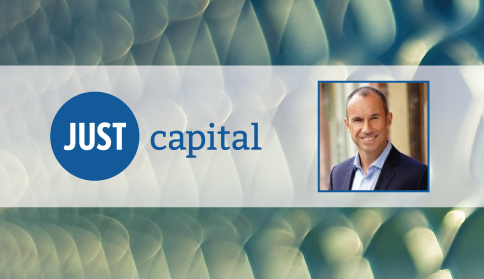Finsbury 26 Aug 2016 // 4:39PM GMT

What is JUST Capital?
We are a nonprofit that’s creating what we hope will become the definitive source of data and rankings on how companies perform on the issues that matter to society. This requires us to do two things – to identify the areas that the public cares most about, and then to analyze companies’ corporate behavior in those areas.
The world’s biggest companies have a critical role to play in solving our biggest challenges. We are looking to empower market stakeholders with better information to make more enlightened decisions about who they are going to work for and do business with. That, in turn, will encourage companies to improve how they treat their employees, society and the environment. Ultimately, it boils down to a faith in information, a faith in markets, and a faith in the human condition.
Where did the idea for JUST Capital come from?
We were co-founded by the investor and longtime philanthropist Paul Tudor Jones and the health and well-being entrepreneur Deepak Chopra, who teaches a course at Columbia Business School called “Just Capital and Cause-Driven Marketing.” Paul is someone who believes deeply in both the intrinsic humanity of the markets and the fact that market participants can only be successful with good, accurate information. JUST Capital really began with Paul and Deepak’s desire to develop the concept of a “JUST” company.
Paul saw the influence that easily-digestible rankings can have – such as U.S. News & World Report’s college rankings or Common Sense Media’s reviews – and he wanted to translate that to the corporate world by developing a ranking of companies based on their “JUSTness.” But what defines “JUSTness?” Instead of us unilaterally deciding, we polled the American people to understand what they believed it meant to be a “JUST” company. Our surveys cumulatively involved over 45,000 Americans and helped us to establish the criteria by which we are going to evaluate companies.
Is there any tangible evidence that shows stakeholders actually care if a company is “JUST”?
Do people care about diversity? Do people care about gender rights and labor rights? Definitely. Just look in the newspaper. These and other issues we’re measuring are defining themes of our time. Do people care enough about these issues to change their behavior, or their buying decisions, or where they work? Evidence on consumer behavior suggests that people are factoring this information into their decisions – as much as they are able to. That’s the catch: right now, it is difficult to find this kind of information. If you’re looking for work, it’s hard to find out which companies are paying a living wage, or providing fair pay to women. If you’re buying a pair of jeans, it’s hard to know if child labor was used in the supply chain. We’re dedicated to compiling that information and making it available to everyone.
What are the values that companies need to communicate to ensure success in today’s marketplace?
Based on our research, polls, and hundreds of conversations, where we see the greatest area of concern is in how companies treat their employees, how they treat their customers, their community, and the people throughout their supply chain. These, by far, stood out in our work. One of the biggest complaints we heard is that people feel commoditized. They don’t feel respected. These are the issues that companies must address to build greater trust with their stakeholders.
How might this initiative help reduce income inequality in the United States?
Indirectly, it could have a huge impact. We heard loud and clear that people want to be treated with respect by their employers, and that that respect is being reflected in their pay. So we are trying to determine how many of the employees at the largest publicly-traded companies in America are getting fair pay based on their job titles and the communities they work in (because the living wage in, say, New York City is much different than in Kansas City.) Once you start to bring transparency to how corporations are paying workers, then you can better understand how business affects income inequality. And to adapt Peter Drucker’s famous words, it becomes much easier to manage a problem once you give companies the ability to measure it.
Where can you access the ranking, and how can companies work with you to improve their score?
We are planning to release our first rankings in the fall of 2016, at justcapital.com. Measuring “JUSTness” is incredibly complex, especially when there is not enough data publicly available. We know that corporate leaders know their businesses better than we do, and we are committed to working with them to make sure that our scoring is as accurate as possible. Since day one, we’ve tried to be very transparent and collaborative with companies that we’re ranking. For instance, we’ve created a secure platform where companies can log on to see the metrics we are using and offer suggestions for alternatives. We wrote to all the CEOs of the companies we are ranking and invited them to log on, and in September we’ll be privately sharing with them the data we’re using to evaluate them.
We want them to understand how they are being measured, and if they have data that better reflects their performance, we’re ready to work with them to include it. Corporations that are being ranked can email us at [email protected] to connect directly with our team and get access to the platform.
In the long run, our goal is to create tools that help companies redirect investments and take action to improve their ranking. We hope to spark an ongoing dialogue, working with companies to surface best practices and showcase their successes.
What will success look like for JUST Capital?
At a high level, we want to restore trust between the public and business. Ultimately, the heart of our mission is about creating a “JUST economy.” We believe that accurate and accessible information, deployed in the right way, can actually change the way our market functions. In terms of real, tangible success – tangible actions by companies – we talk about outcomes. What are the outcomes we seek? More people being paid a living wage. More people being provided with comprehensive benefits. More people supporting business and being involved in business decision making. All of these outcomes will take time and are very difficult to measure. But without the bigger goals, what purpose does the information we’re collecting ultimately serve?
By: Graham Buck, Senior Vice President at Finsbury


































.jpg)





---copy.jpg)









